|
|
|
Sort Order |
|
|
|
Items / Page
|
|
|
|
|
|
|
| Srl | Item |
| 1 |
ID:
129243
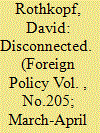

|
|
|
|
|
| Publication |
2014.
|
| Summary/Abstract |
The fabric of civilization is being rewoven around us. The very nature of life, work, and society is changing so profoundly that we are approaching a moment at which our old ways of thinking about the structures that sustain us may be seen as obsolete. This happens periodically throughout history -- think of the Renaissance, the Reformation, the Enlightenment, and the Industrial Revolution. Such eras often produce turmoil or upheaval, until leaders emerge who are able to help shape a new order for a new age.
The question today is whether our leaders are up to the challenge. Given their lack of grounding in the world's most pressing scientific and technological issues, I fear many, if not most, are not. Formerly disenfranchised populations are increasingly connecting to telecom, Internet, and other services. For instance, mobile-phone penetration was estimated to have surpassed 80 percent in Africa in the first quarter of 2013, according to figures published in 2012 by ABI Research. What's more, it is growing faster in Africa than anywhere else in the world. And though smartphone penetration in Africa is just 20 percent -- pretty near global levels -- it is expected to explode in the next few years.
|
|
|
|
|
|
|
|
|
|
|
|
|
|
|
|
| 2 |
ID:
129232
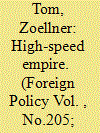

|
|
|
|
|
| Publication |
2014.
|
| Summary/Abstract |
Chinese rail is sprawling, modern, and elegant. It's also convoluted, corroding, and financially alarming. Wanna take a ride? THE BULLET TRAIN hurtles toward the industrial city of Taiyuan in northern China, and seemingly within seconds, the modern, smog-soaked Beijing skyline gives way to open fields. David Su is munching on pistachios in the bar car, careful that not a crumb hits his blue foulard scarf, as he heads some 320 miles to reach his early-morning appointment for a private equity firm. Over his shoulder, the Chinese countryside is a disembodied blur: farms and factories receding at the mind-aching speed of 186 miles per hour. Cars on a nearby highway seem to be creeping along by comparison. Su travels frequently for his job at Global Capital Investments Group, and he likes this new high-speed train, zipping along on one of several dozen lines built by the Chinese government in a decade-long blitzkrieg program that now has a price tag of $500 billion.
|
|
|
|
|
|
|
|
|
|
|
|
|
|
|
|
| 3 |
ID:
129233
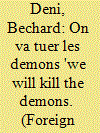

|
|
|
|
|
| Publication |
2014.
|
| Summary/Abstract |
Inside a small concrete church, lit by a few tungsten bulbs hanging from exposed wires, hundreds of people stood packed Together in stifling heat, repeating the words their pastor Bellowed into a microphone. It was after midnight in Kinshasa, the capital of the Democratic Republic of the Congo, but the service was just getting under way. The pastor, Pierre Pinda Buana, wore a simple, blue button-down shirt. Its acrylic shimmered as he moved around the center of the room--smooth, practiced, confident. For almost an hour, Pinda led his congregation through songs and chants, the fervor in the church mounting. Then he preached about the main event they had all come to witness: exorcism. Charles, a Congolese friend of mine, who asked that I not use his real name, translated Pinda's words from Lingala, a local language, to French. But the cries, clapping, and ululations of the crowd often drowned out his voice. Pinda began describing a demon that was living in the body of a woman who stood before him, almost entirely blocked from my sight by the crowd: "It's attacking the heart. It's attacking the stomach. It strikes faster than an arrow." He called out to the demon, asking why it wanted to kill the woman. Electrical contacts crackled--I glimpsed a church assistant crouched over a fuse box in the rear doorway--and the bulb dangling above Pinda went dark. Light fell inward from the corners of the room, yellow and angular. Suddenly, the woman collapsed onto the ground and began shouting. The crowd pressed in around her as she writhed and arched her back.
|
|
|
|
|
|
|
|
|
|
|
|
|
|
|
|
| 4 |
ID:
129230
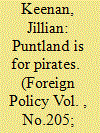

|
|
|
|
|
| Publication |
2014.
|
| Summary/Abstract |
H ARGEISA, Somalia - Mowlid Ahmed Abidoon stands quietly in the small prison cell where he has lived for nearly two years. Slot windows on one wall let in only a little sunlight, leaving his face almost entirely obscured in darkness. Yet there are splashes of color all around: The room's bunk beds are covered in sheets with bright floral and geometric patterns, over which hang canopies of blue mosquito nets -- cells within the cell. Clad in a striped polo shirt and prison-uniform pants, Mowlid estimates that he is about 20 years old; the last traces of baby fat still cling to his cheeks. He insists that he shouldn't be behind bars. "I'm a fisherman, not a pirate," he says flatly, as though he has delivered this speech a hundred times before. Court documents from Seychelles say otherwise. On Dec. 6, 2009, Mowlid and a band of fellow Somali pirates used firearms and explosives to attack the Topaz, a Seychelles Coast Guard patrol vessel. (Seychelles, an island nation, is about 825 miles southeast of Mogadishu, Somalia's coastal capital.) They were arrested, convicted, and sentenced to 24 years in prison.
|
|
|
|
|
|
|
|
|
|
|
|
|
|
|
|
| 5 |
ID:
129240


|
|
|
|
|
| Publication |
2014.
|
| Summary/Abstract |
L in Sun Oo doesn't take his eyes off the field and forest before him -- the rich green grass and the leaves on the lush trees stand, almost obediently, as still as statues. It is quiet. It is motionless. It is going to be the perfect shot, he thinks. To the right of him, his cameraman patiently peers into a viewfinder and, with a few careful adjustments, locks the image into focus. Before long, a thin pole of a man -- an elderly farmer named U Thaung Khaing, whose tanned, wrinkled hands are weathered from decades of working the land in central Burma -- inches into view. Barefoot and dressed in a brown longyi, white button-down shirt, and straw hat, he glides along a winding dirt path that slices through the dominant green in the shot. The producer exhales. The scene is exactly what he had envisioned -- and will be the perfect opener for his upcoming documentary. In Lin Sun Oo's film, U Thaung Khaing's soft voice narrates a moving portrayal of Than Bo Lay, a village in Magway district, where, in 2010, the regime confiscated land from the area's farmers. During the military's rule, the regime regularly appropriated property for its development projects, while offering little or no compensation to those who relied on the fields for their livelihoods.
|
|
|
|
|
|
|
|
|
|
|
|
|
|
|
|
| 6 |
ID:
129229
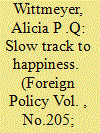

|
|
|
|
|
| Publication |
2014.
|
| Summary/Abstract |
Anyone who has been in a Muslim country during Ramadan knows the transformation that comes about with the first sighting of the crescent moon. During the holy month, the devout fast from sunrise to sunset. Bustling thoroughfares go quiet; office hours are shorter to accommodate fasting employees; and business grinds to a halt, to the frustration of expats and foreign partners. Now, a new paper from two Harvard University researchers confirms what until now has only been a nagging suspicion: Religion isn't good for the economy. Economists Filipe Campante and David Yanagizawa-Drott examined data from every Ramadan since 1950, using the amount of time spent fasting as a measure for intensity of religious practice. Focusing on countries that were more than 75 percent Muslim, they found that when people spent more time fasting -- when Ramadan fell during the long days of summer, for instance -- it took a bigger toll on economic growth. Increasing the average daily fast in a country from 12 to 13 hours, for example, decreased GDP growth by about 0.7 percentage points, the authors found. More-intense religious ractice, in other words, left worshippers poorer. And being poorer makes you less happy, right?
|
|
|
|
|
|
|
|
|
|
|
|
|
|
|
|
| 7 |
ID:
129231
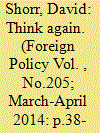

|
|
|
|
|
| Publication |
2014.
|
| Summary/Abstract |
An Ironclad Treaty Is the Only Way to Save the Planet. Don't count on it. Time is running short for the international community to tackle climate change. Pressure to act comes from rising temperatures and sea levels, superstorms, brutal droughts, and diminishing food crops. It also comes from fears that these problems are going to get worse. Modern economies have already boosted the concentration of carbon dioxide (CO2) in the atmosphere by 40 percent since the Industrial Revolution. If the world stays on its current course, CO2 levels could double by century's end, potentially raising global temperatures several more degrees. (The last time the planet's CO2 levels were so high was 15 million years ago, when temperatures were 5 to 10 degrees Fahrenheit higher than they are today.) Another source of pressure, however, is self-imposed. Under the auspices of the United Nations, the next global climate treaty -- to be negotiated among some 200 countries, with the central goal of cutting greenhouse gas emissions -- should be enacted in 2015, to replace the now-outmoded 1997 Kyoto Protocol. (Once passed by state parties, the new treaty would actually go into effect in 2020.)
|
|
|
|
|
|
|
|
|
|
|
|
|
|
|
|
| 8 |
ID:
129228
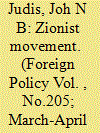

|
|
|
|
|
| Publication |
2014.
|
| Summary/Abstract |
The American Israel Public Affairs Committee (AIPAC), a lobby once dubbed an "800-pound gorilla" for its ability to frighten senators and representatives into supporting its efforts on behalf of Israel, recently seems to have lost a bit of heft. Beginning last fall, it strongly backed legislation that, if passed, could have derailed ongoing negotiations to restrain Iran's nuclear program. That bill obligated President Barack Obama to seek a deal requiring Iran to dismantle all its nuclear facilities, while also forcing him to certify that Iran was neither supporting terrorism nor testing ballistic missiles -- and it would have imposed new sanctions if those conditions were not met. (An interim deal reached last November limited Iran's enrichment activities but did not require the closure of any facilities.) The Obama administration opposed the legislation, but spurred by AIPAC's efforts, the bill garnered 59 co-sponsors in the Senate -- one shy of ensuring that it could overcome a filibuster.
|
|
|
|
|
|
|
|
|
|
|
|
|
|
|
|
|
|
|
|
|